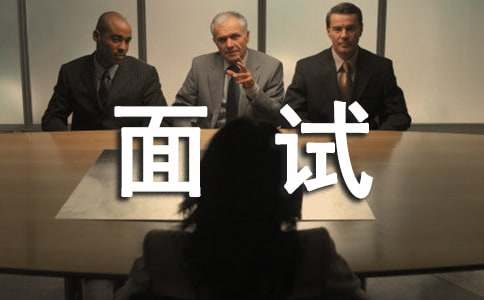如何打動(dòng)面試官的心
The job interview is a two-way street.求職面試是一種雙向溝通。

You should be assessing the employer just as much as they're assessing you, because you both need to walk away convinced that the job would be a great fit ... and the evaluation should start from the moment you take the hot seat.你會(huì)像面試官評(píng)估你一樣評(píng)估對(duì)方,因?yàn)槟銈冸p方都需要在面試結(jié)束時(shí)確定這個(gè)工作是否適合你。而評(píng)估,就在你選擇職位的那一刻就已經(jīng)開始了。
At the very end of the interview, the hiring manager usually asks, "Do you have any questions for me?" But don't wait until they turn the tables to start asking questions.在面試的最后階段,招聘經(jīng)理通常會(huì)提問(wèn):“您有沒(méi)有什么想向我提出的問(wèn)題?”不過(guò),我建議你不要等到他們開始提問(wèn)面試問(wèn)題的時(shí)候才提出。
Lynn Taylor, a national workplace expert and the author of "Tame Your Terrible Office Tyrant: How to Manage Childish Boss Behavior and Thrive in Your Job," says that there are a few you should ask at the very beginning of the conversation. Lynn Taylor,是國(guó)內(nèi)的職場(chǎng)專家,也是《馴服職場(chǎng)暴君:如何搞定幼稚老板,成就輝煌事業(yè)》一書的作者。她表示,在面試的最開始階段你就應(yīng)該提出一些問(wèn)題了。
Here are four of them, along with her reasons for asking these early on:下面是其中的4個(gè)問(wèn)題,Taylor還進(jìn)行了解釋:
1. 'How did this position develop?'1. “這個(gè)職位是如何出現(xiàn)的?”
This is a good conversation starter on your end, says Taylor:Taylor表示,這對(duì)面試者來(lái)說(shuō)是一個(gè)很好的開場(chǎng)提問(wèn):
"It demonstrates intellectual curiosity, yet isn't intrusive or brash. It's also helpful to let the hiring manager talk, as you gather some history on the position. You'll get some insight on whether the opening is due to turnover or growth, for example."“這個(gè)問(wèn)題可以顯示你的求知欲,而且不會(huì)顯得唐突無(wú)禮。能夠有效地讓面試官為你提供信息,以此了解這個(gè)職位的過(guò)往。比如,你還能從中了解到這個(gè)職位的空缺是出于人員調(diào)整還是職業(yè)發(fā)展的需要。”
2. 'How does this role fit into the larger objectives of the department and company?'2. “這個(gè)職位對(duì)于部門和公司的發(fā)展方向作用如何?”
Try to ascertain the big picture in the early stages of the interview, suggests Taylor.Taylor建議,在面試的初始階段就應(yīng)該確定公司的.發(fā)展方向。
"This will help you better frame your answers in a way that's more meaningful. It's easier to sell your skills when you can relate them to the company's larger strategy," she says.“這樣能夠幫助你把自己的回答調(diào)整得更有意思。這樣你就能把個(gè)人特長(zhǎng)與公司發(fā)展策略更好地聯(lián)系起來(lái)了。”她說(shuō)道。
3. 'What do you like most about working here?‘’3.“這家公司最讓您滿意的是什么?”
This is a friendly, nonthreatening question that works early on because it's conversational, and you're showing interest in the interviewer.這是一個(gè)友好的,無(wú)害的問(wèn)題,在面試初期可以提出來(lái),因?yàn)檫@是對(duì)話性質(zhì)的問(wèn)題,顯示你對(duì)面試官感興趣。
Taylor says: "It can also be received as flattering, but at the same time, you're getting to know the hiring manager.Taylor表示:“這個(gè)問(wèn)題容易被視為奉承的話語(yǔ),不過(guò)與此同時(shí),你就會(huì)更了解招聘經(jīng)理的脾氣了。”
"Are they thrilled about mentoring their staff, their product or service, the innovative atmosphere? Do they focus on only growth numbers and minimizing expenses, with no mention of the team, training, or growth opportunities? It gives you a sneak preview into your prospective manager's priorities and all-important personality. This is where it pays to have your people radar up, to evaluate if this is a boss you can respect.""他們是否對(duì)培訓(xùn)新人感到激動(dòng)?是否對(duì)產(chǎn)品或服務(wù),對(duì)充滿創(chuàng)造力的環(huán)境氛圍充滿激情?他們是否只關(guān)注營(yíng)業(yè)額和削減開支,而不顧團(tuán)隊(duì)、培訓(xùn)和發(fā)展機(jī)會(huì)?這個(gè)問(wèn)題可以讓你提前了解未來(lái)雇主的關(guān)注點(diǎn)及其個(gè)人特點(diǎn)。這就要你們保持清醒的頭腦,然后評(píng)估這個(gè)老板是否值得尊敬了。”
4. 'Can you describe some of the specific responsibilities or describe a typical day?'4.“你能說(shuō)說(shuō)這個(gè)職位的職責(zé)或日常工作是怎樣的嗎?”
You want to show you did your homework, so right after asking this, you might consider saying something like, "For example, I know that some of the core functions are A, B and C, but perhaps you can elaborate?"你希望向面試官顯示你已經(jīng)做好面試準(zhǔn)備工作,所以當(dāng)你提出了這個(gè)問(wèn)題后,你可以這么說(shuō):“比如,我知道這個(gè)職位的職責(zé)主要有A、B、和C,但您能否更詳細(xì)的講解一下?”
"This is your opportunity to drill down on specific job objectives and tasks, beyond what you were given prior to the interview," says Taylor. "At the same time, you want to make it clear that you fully understand what was in the job listing or description. That's why you want to touch on a few examples before turning over the question to the interviewer."Taylor說(shuō)道:“這就是給你深入挖掘求職意向和職業(yè)任務(wù)的機(jī)會(huì)了,這些都是在面試前你從未接觸過(guò)的。與此同時(shí),你也希望清楚自己是否已經(jīng)對(duì)工作的職責(zé)有深刻的了解。這就是你要在面試官提問(wèn)前首先提問(wèn)的原因。”
Offer a framework so the hiring manager understands your interpretation of the job, and can formulate an appropriate answer.擺脫面試流程的條條框框,能讓招聘經(jīng)理了解你對(duì)職位職責(zé)的理解程度,然后構(gòu)建一個(gè)得體的回答。
【如何打動(dòng)面試官的心】相關(guān)文章:
一分鐘打動(dòng)面試官如何打動(dòng)面試官11-15
如何打動(dòng)你的面試官的小技巧01-13
自我介紹應(yīng)該如何打動(dòng)面試官12-29
自我介紹如何去打動(dòng)面試官12-27
自我介紹該如何打動(dòng)面試官12-27
自我介紹如何打動(dòng)面試官呢11-26
應(yīng)屆畢業(yè)生如何打動(dòng)面試官09-15
打動(dòng)面試官的最佳技巧01-26